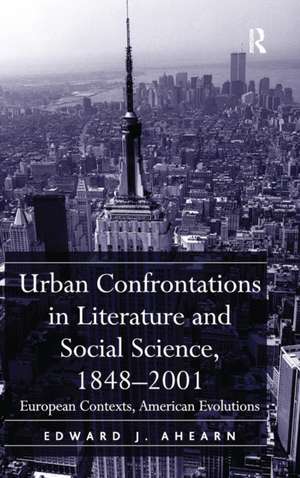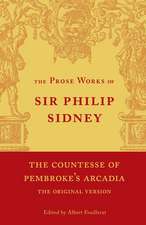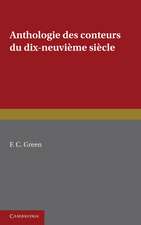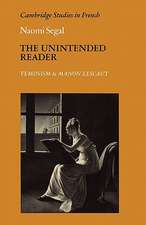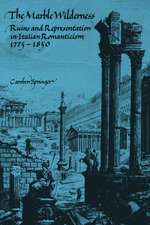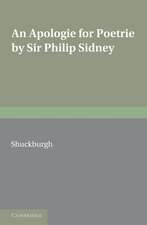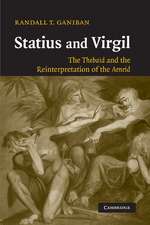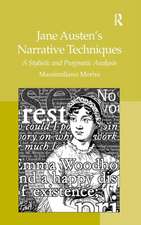Urban Confrontations in Literature and Social Science, 1848-2001: European Contexts, American Evolutions
Autor Edward J. Ahearnen Limba Engleză Hardback – 28 ian 2010
| Toate formatele și edițiile | Preț | Express |
|---|---|---|
| Paperback (1) | 336.40 lei 6-8 săpt. | |
| Taylor & Francis – 15 noi 2016 | 336.40 lei 6-8 săpt. | |
| Hardback (1) | 818.17 lei 6-8 săpt. | |
| Taylor & Francis – 28 ian 2010 | 818.17 lei 6-8 săpt. |
Preț: 818.17 lei
Preț vechi: 1104.51 lei
-26% Nou
Puncte Express: 1227
Preț estimativ în valută:
156.60€ • 163.21$ • 130.36£
156.60€ • 163.21$ • 130.36£
Carte tipărită la comandă
Livrare economică 06-20 ianuarie 25
Preluare comenzi: 021 569.72.76
Specificații
ISBN-13: 9780754668824
ISBN-10: 0754668827
Pagini: 248
Dimensiuni: 156 x 234 x 16 mm
Greutate: 0.62 kg
Ediția:1
Editura: Taylor & Francis
Colecția Routledge
Locul publicării:Oxford, United Kingdom
ISBN-10: 0754668827
Pagini: 248
Dimensiuni: 156 x 234 x 16 mm
Greutate: 0.62 kg
Ediția:1
Editura: Taylor & Francis
Colecția Routledge
Locul publicării:Oxford, United Kingdom
Cuprins
Contents: Introduction: breaking the glass; Part I The Heroism of Modern Life? Baudelaire, Brecht and the Founders of Urban Sociology: City visions of the poet and social scientist; 'Let's beat up the poor!' Baudelaire on urban conflict and the failure of policy; In the jungle of Brecht's cities. Part II Chicago Black and White: Immigration and Race in Native Son and The Adventures of Augie March: Introduction to Part II; The native son we didn't (and still don't) want to see; Augie's immigrant adventures. Part III Power, Governance and the Struggle for Human Realization: Bureaucracy and the lone city dweller: James Q. Wilson - and Michel Foucault - meet Bartleby; Jazz and The Power Broker: urban tycoon versus the real lives of ordinary Black people; Immigrant women writing against the urban regime: The House on Mango Street and Bone; Epilogue: DeLillo's global city; Bibliography; Index.
Notă biografică
Edward J. Ahearn is University Professor and Professor of Comparative Literature and French Studies at Brown University, USA. He has received the Workman and Harbison awards for teaching, and held Fulbright and National Endowment for the Humanities fellowships. His publications include Rimbaud, Visions and Habitations, Marx and Modern Fiction, and Visionary Fictions: Apocalyptic Writing from Blake to the Modern
Recenzii
'... it is as a reader of texts, and particularly literary texts, that Ahearn shines. His readings of literary works are impressive and invariably illuminating. Ahearn engages these texts profoundly, working to make connections between them and the abiding problems of the modern city.' Priscilla Parkhurst Ferguson, Columbia University, and author of Paris as Revolution: Writing the 19th-Century City ’Ahearn brings an impressively comprehensive knowledge of the field to his readings, from Émile Durkheim and Max Weber to recent studies of global cities by David Harvey and Manuel Castells. Urban Confrontations assembles a rich assortment of politically committed writers whose work testifies to a significant overlap between literary representations of the city and sociological ones.’ Times Literary Supplement ’Ranging from the poetry of Baudelaire to the fiction of Don DeLillo, set adjacent to the work of social scientists from Durkheim to Harvey, Ahearn’s innovative work captures the exuberance and paradoxes of city life, and generates a contradictory and riotous light on the urban landscape... This interdisciplinary project is exhilarating... The scope of this assemblage with its pretension to span the development of urban theory through its fictional accompaniments makes Urban Confrontations groundbreaking.’ Housing Studies Journal ’Ahearn is a comparatist, and this is a fine example of what comparative literature can achieve... The scope of comparative work is extraordinarily wide, and much depends on what the scholar chooses from an ocean of possibilities. In every respect, Ahearn has chosen well.’ British Society for Literature and Science 'Ahearn provides deft plot summaries, and strategic reminders of his process, to clarify his interpretations and critiques. This is an exemplary pedagogical work, the fruit of a life-time of award-winning teaching and co-teaching at Brown University.' Literaturesalon’s Blog
Descriere
Edward J. Ahearn shows that together, works from literature and the social sciences can illuminate city life in ways that neither can accomplish separately. Whether viewing Charles Baudelaire alongside Emile Durkheim and Georg Simmel or Herman Melville's "Bartleby the Scrivener" as a challenge to James Q. Wilson's Bureaucracy, Ahearn does justice to the complexity of his subject matter. Ultimately, Ahearn suggests, neither literature nor the social sciences can capture the experience of urban misery.
